Raising the Steaks: Hansen’s Wagyu-Holstein beef gets Prime grade
May 25, 2022 5:08 pmBy Meta Hemenway-Forbes, Hansen’s Dairy Marketing Manager
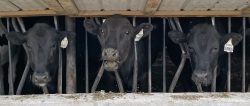
Wagyu-Holstein cows Hulu, King Kong and Lebron enjoy a relaxing lunch on the Hansen farm.
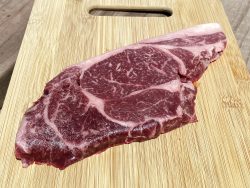
Wagyu beef is known for its superior marbling and is evident in this Hansen Wagyu-Holstein ribeye.
At Hansen’s Dairy we’re renowned for our delicious milk, cheese curds, ice cream, butter and heavy cream.
But alongside our Holstein dairy herd is a Wagyu-Holstein beef herd making its own mark.
Hansen’s Wagyu-Holstein beef was recently given a Prime grade by a team from Iowa State University’s Meat Science Department. The grade is based on standards set forth by the U.S. Department of Agriculture. The ISU student team, led by a researcher and meat judging coach, grades beef from Iowa lockers and meatpacking plants.
Prime is the highest grade of beef in the U.S., and less than 2% of beef produced in this country earns that grade, according to the USDA. A Prime grade on our Wagyu-Holstein beef is welcome, validating news to Herd Manager Blake Hansen. Blake was unaware that his beef was going to be judged, but was pleased to see the results.
“I’ve been seeing the consistent quality of that meat for five years. It was only only a matter of time to see that grade,” he said.
Customer feedback also has been an indicator of the Wagyu-Holstein beef quality, Blake added.
“Our customers love it. I’ve had people tell me I should enter our Wagyu-Holstein meat in contests.”
USDA standards assign beef grades based on tenderness, juiciness and flavor. Beef is graded on the following scale:
- Prime: Prime beef has abundant marbling (the amount of fat interspersed with lean meat), between 8% and 13% fat. Considered high-end beef, it is juicy, flavorful and tender.
- Choice: Choice beef is high quality but with less marbling than Prime beef.
- Select: Select beef is uniform in quality but leaner than the higher grades. It’s tender, but because it has less marbling it often lacks the juiciness and flavor of Prime and Choice beef.
- Standard: This beef is frequently sold as ungraded or store brand meat.
MAKING THE GRADE
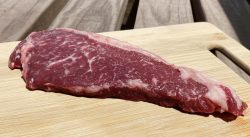
This well-marbled Wagyu-Holstein New York strip is ready for the grill.
ISU Research Assistant and Meat Judging Coach Caroline Dewey led the ISU team that graded our Wagyu-Holstein beef. The process took place over two days at the Clarion Locker where the beef is processed. As is standard USDA grading practice, the team evaluated the carcasses and the cuts.
“Typically what we do is go in between ribs 12 and 13 to evaluate for a marbling score. The more we see those intramuscular white flecks, the better the grade quality will be,” Caroline said.
Wagyu beef is world-renowned for its extraordinary marbling, which results in tender, flavorful meat. Superior marbling is represented by evenly dispersed fat, not bands or clumps, but as tiny pinhead dots or a spider web of ultra-thin veins throughout the entire muscle.
Caroline said her team generally doesn’t know what cattle breed they’re grading. Clarion Locker owner Manie Nel told the team afterward that the Hansen’s beef they graded was a Wagyu-Holstein cross.
“Looking at the marbling I expected it to grade fairly well on the USDA standard,” Caroline said. “It’s very, very high marbling. It’s good for producers to know how their cows are grading, and (the team) very much did grade it Prime.
“It was really a great experience for my students. They’ve seen Wagyu steaks in the store. They are quite expensive. It was a great opportunity for them to be able to evaluate a Wagyu crossed with a Holstein and to see the genetics at work.”
GENES, CARE AND FEEDING
The genetics that produce our Prime Wagyu-Holstein beef require careful, intentional planning by Blake.
The Wagyu beef breed is the backbone of world-renowned Kobe beef. Kobe beef specifically refers to the Tajima bloodline of Japanese Black Wagyu cattle. To be called Kobe beef, it must be from purebred Japanese Black Wagyu that are raised, fed and slaughtered in the Hyogo prefecture of Japan.
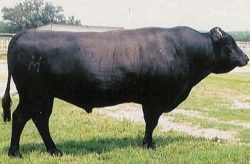
Hansen’s Wagyu-Holstein beef is sired by world-renowned Wagyu bull World K Sanjirou.
Our beef cows are mothered by a Holstein cow and sired via artificial insemination by a revered Wagyu bull named World K Sanjirou, who is said to be one of the most influential bulls of the Tajima line. In fact, in 2017 World K Sanjirou was ranked third in the world for his superior marbling.
“When I first started doing this I wanted to have the same quality — consistent quality,” Blake said. “So I wanted to pick out the sire that has the reliability to do that. This bull, Sanjirou, is noted for his exceptional ribeye muscle and is the best carcass bull grade outside of Japan.”
Genetics is one key factor in producing quality beef. Care and feeding are crucial, too. Our Wagyu-Holstein beef cows are housed and fed alongside our Holstein dairy heifers. None of our cows are ever treated with growth hormones or preventive antibiotics.
About 83% of their feed — corn silage and alfalfa — is grown on our farm. Blake eyes his beef cows’ nutritional needs closely.
“You don’t want to give a high-energy diet. They get fat too fast, and that fat is mostly back fat. The fat doesn’t sink into the muscle for good marbling,” Blake explained. “The goal is for them to gain 1.7 to 2.2 pounds per day.”
Typical American beef cows, like Angus, are usually butchered around 12 to 15 months old. In contrast, Wagyu cows are butchered around 30 months, as they develop the most marbling in their muscle between 24 and 30 months. Because Wagyu and Wagyu-cross cows are fed and cared for twice as long as typical beef cattle, the cost to the farmer is much higher. Therefore, Wagyu and Wagyu-cross meat is more expensive. But oh, the flavor! Worth it!
The environment in which Wagyu beef is raised also plays a role in the flavor and tenderness of the meat. Healthy, stress-free cows are happy cows. And happy, calm beef cows produce quality meat.
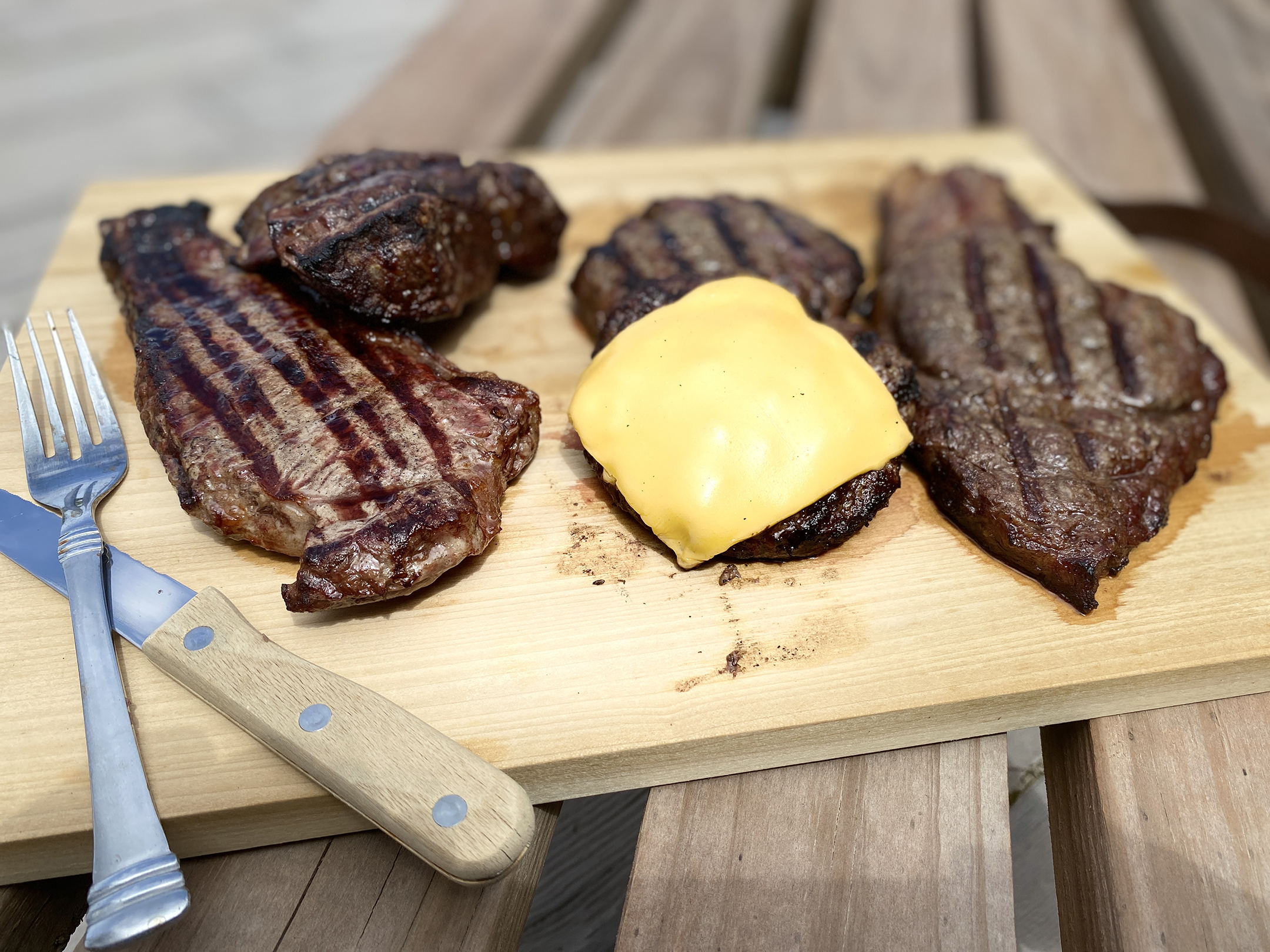
Enjoy Hansen’s Wagyu-Holstein cuts right off the grill!
“We insist on a low-stress environment here,” Blake said. “The cows aren’t getting run through chutes. They get to go out on the dirt lots for exercise. They’re not having any calves. They’re here to grow and be happy.”
Clarion Locker owner Manie said the Prime Grade of our Wagyu-Holstein beef is a fitting reward for Blake’s efforts.
“We’re really proud of what he managed to accomplish with this meat,” Manie said. “When it leaves our building we’re obviously very happy with it, and we know Hansens’ customers are going to be happy.”
Count yourself among our happy customers and try some Hansen’s Wagyu-Holstein beef today! Our cuts include filet, ribeye, New York strip and, upon request, brisket. We also offer Wagyu-Holstein ground beef by the pound and in 1/3-pound patties, as well as beef sticks in three flavors — Cheddar Cheese, Jalapeno Cheddar and plain. Beginning June 1, we’ll have Wagyu-Holstein beef jerky in stock as well.
You can find it all at our three retail stores:
- 123 E. 18th St., Cedar Falls
- 3015 Kimball Ave., Waterloo
- 8461 Lincoln Road, Hudson
Want more information or a special order? Give Blake a call at (319) 610-1530.
HOW TO PREPARE
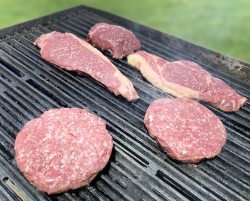 Here are some things to know when preparing Wagyu-Holstein beef:
Here are some things to know when preparing Wagyu-Holstein beef:
- Small serving sizes. Wagyu is very tender and has a buttery flavor. Steak serving sizes are typically smaller because of the rich flavor profile.
- Faster cooking time. Wagyu cooks faster than other beef. It is recommended that steaks are cooked to no more than medium rare for optimum palatability.
- Juicy hamburger. Wagyu-Holstein beef is about 85% lean.

